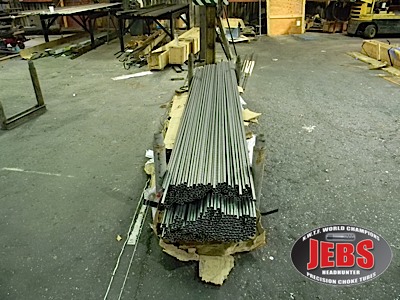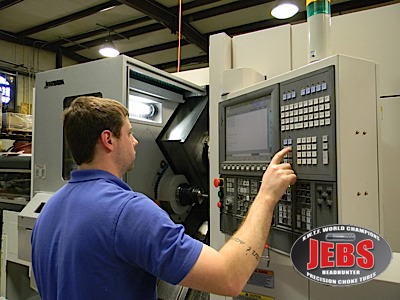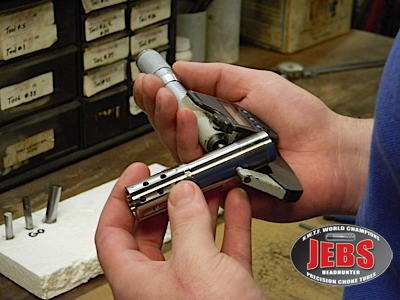JEBS News & Blog - Headhunters
How are Jebs Chokes Made? See our Manufacturing Process!
Posted on 28th Jan 2015
The Process:
 Jebs chokes first start with the highest quality 17-4 stainless available. We then take the raw bar stock and send it out to a heat treating facility where we have it heat treated to a 44 rockwell hardness. To try to help you understand what this process does, the heat treating process actually hardens the stainless so that the shooter can shoot the newer harder tungsten based ammo as well as steel ammo. These types of ammo that I have mentioned are all about 30 on the rockwell hardness scale, which is much harder than most choke tubes on the market.When we receive the treated bar stock we then send it to our machining facility, where we have state of the art CNC machines that can hold the highest tolerances in the industry. We also combined our precision machining with our patented interior bore design. This gives our customers that extra edge when in the field or at any type shooting event they choose.
Jebs chokes first start with the highest quality 17-4 stainless available. We then take the raw bar stock and send it out to a heat treating facility where we have it heat treated to a 44 rockwell hardness. To try to help you understand what this process does, the heat treating process actually hardens the stainless so that the shooter can shoot the newer harder tungsten based ammo as well as steel ammo. These types of ammo that I have mentioned are all about 30 on the rockwell hardness scale, which is much harder than most choke tubes on the market.When we receive the treated bar stock we then send it to our machining facility, where we have state of the art CNC machines that can hold the highest tolerances in the industry. We also combined our precision machining with our patented interior bore design. This gives our customers that extra edge when in the field or at any type shooting event they choose.

What Makes Jebs Interior Bore Design So Different?
Jebs interior bore design is very different from existing choke tubes on the market. Our patented design has 2 restrictions and 2 stabilizing parallels evenly distributed down the length of the tube. What this does is, it allows use to put drag on the wad cup in the first restriction, then the shot are able to start out of the wad cup freely because the next step is just for stabilization. The third step is another restriction which form the shot into a column and increases the amount of drag on the wad cup even more. The last step in the choke is another stabilizer which steadies the shot in the tube as they exit the end of the choke itself.This allows us to release the shot out of the choke before the wad cup which helps in several different ways. One way it helps is, it cuts back on some felt recoil because you are not pushing the hole pay load out of the end of the tube all at once by separating the shot from the wad. Secondly it has drastically cut down on wad cup deflection, which means the shot are not knocked off course by the wad cup as the shot stream goes down range.
 Finally the outcome of this design has allowed us to entrap more pellets in a smaller area on the target at much longer yardages. Our pattern sizes are now about 90% pellet entrapment with in a 20" circle, and that will give the shooter a real dense 10" circle within the center of the pattern.
Finally the outcome of this design has allowed us to entrap more pellets in a smaller area on the target at much longer yardages. Our pattern sizes are now about 90% pellet entrapment with in a 20" circle, and that will give the shooter a real dense 10" circle within the center of the pattern.
 Loading... Please wait...
Loading... Please wait...
